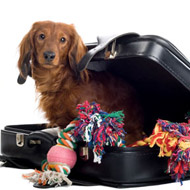
Free webinar aims to help veterinary professionals get to grips with pet travel changes.
BVA has joined forces with Defra to provide a free webinar: “EU Pet Travel Scheme: Information and updates”. It is hoped that the webinar will help veterinary professionals get to grips with the new pet travel changes, which are due to come into force on December 29, 2014.
The changes to pet travel follow considerable concern over the amount of pets being illegally imported with fake passports, heightening disease risk in the UK.
The new regulations will consolidate current EU legislation on pet travel and enhance the requirements for EU countries to make information about pet travel available to their citizens. The changes also aim to tackle abuse of the pet travel scheme by introducing a more secure pet passport, tightening eligibility requirements and strengthening enforcement activity.
The webinar aims to address concerns and questions around levels of compliance with current rules, how border checks are carried out and queries about vets’ rights and responsibilities with regard to seizing non-compliant dogs.
In BVA's recent webinar with President Robin Hargreaves, the proposed changes and what they mean for small animal vets were discussed in detail. The webinar is available to view at: www.thewebinarvet.com/bva-webinars/
Vets and other stakeholders have been invited to give their views on changes to pet travel regulations. Defra has launched a six-week online survey on the implementation of planned changes to the EU pet travel scheme and is calling for vets, pet owners, transport companies and other interested parties to submit their views on the proposed changes.
Visit Defra's website for further information on the consultation, and to complete the survey: www.consult.defra.gov.uk/animal-health-and-welfare/changes-to-the-eu-pet-travel-scheme
Image (c) iStockphoto.com/eriklam



 The Animal and Plant Health Agency (APHA) has updated its online reporting service for dead wild birds.
The Animal and Plant Health Agency (APHA) has updated its online reporting service for dead wild birds.